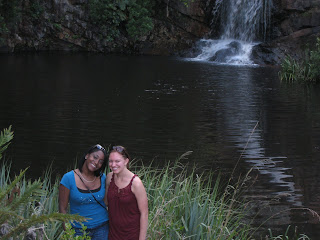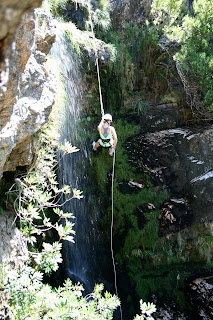[Every time I type the title in the box, it changes it to some form of Asian characters...and the only to avoid it is to use no punctuation and spaces. Sorry!]
Molweni!
I realize that I haven’t been doing very well at keeping this up to date, so these pictures are from a little over a week ago. We went on a weekend-long retreat to Hermanus, which is about an hour and a half drive away. The main purpose of the retreat was to meet John de Gruchy, the author of a book we were required to read about the theology of reconciliation in the context of South African apartheid and the resulting TRC (Truth and Reconciliation Commission).
We stayed on a property specifically meant for retreats called Volmoed. As you can see from the pictures, it was incredibly gorgeous, as was the drive along the coast on our way to Hermanus. I felt that the majority of the views I took in were post card-worthy and that the photos I took simply can’t do justice to the awe-inspiring landscape.

Aside from our sessions with John de Gruchy, we had a lot of free time, which we spent relaxing and exploring the beauty of the property. There were a few hiking trails, and you’ll see pictures from the one that led to a waterfall. Also, several people in the group encountered groups of baboons, but I wasn’t so lucky…which might’ve been a good thing, after all, considering they can get violent if they feel threatened. Nonetheless, I would’ve like to have seen them…perhaps I’ll steal a picture from someone so you can all see, though.

~ the waterfall on Volmoed property

~Ranice and me near the waterfall :)

~another view while hiking around Volmoed

~oceanview in Hermanus...if it were whale season, this is where we would've seen them
Also, I’ve been continuing to add to my list of obz-ervations…
4) Mangos: This didn’t take much detective work to uncover, but mangos are incredibly popular and available here, so I eat them a few times per week. I’m getting really good at cutting them, too, which was always a cryptic challenge in the past. (Mom, you probably remember our unsuccessful attempts…)
5) Stolen phones: Apparently, it’s so common to have your phone stolen here that our program director claims that everyone goes through one or two phones during our 5ish months here. Well, as of this past weekend, I’m #4 in the house to have my phone swiped. Perhaps it’s some sort of right of passage to South African living? Ha. I don’t know, but I do know that our phones are the cheapest models anyone can purchase here, so why someone would go through the effort of stealing them is beyond me. Regardless, I was prepared for this to happen, so I’m currently trying to enable the phone I used last summer in Paris.
6) Raw carrots (and vegetables, in general): When I go to my service sites on Mondays and Thursdays, I always pack a lunch. Typically, I pack some raw carrots to munch on, and I’ve discovered that the 2nd graders get a huge kick out the fact that I’m eating them. The teacher told me that it’s nothing huge, but that no one here really eats raw vegetables, so the kids think I’m funny…
7) Left side of everything: One would think I would’ve noticed this more prominently during my long stay in Europe last summer, but it wasn’t until I’ve lived here that I realize that rules of the road are reflected everywhere. What I mean is that people constantly, naturally move left, rather than right, so my housemates and I have been finding ourselves in awkward run-ins with locals while trying to pass them and then realizing that we’re going the wrong way. Oops. I guess I have something to work on.
8) Hand soap: The only place I go where I am guaranteed hand soap is K House. Every bathroom I set foot in has a soap dispenser, but there has only been ONE time that I found one with soap…and this includes public bathrooms, the bathrooms at the elementary school, the bathrooms at UWC…everywhere.
9) Toilet paper: Along the same lines of bathroom etiquette/tendencies, living here has caused me to no longer take toilet paper for granted. Some bathrooms have it in the stalls (but run out often), but many have one roll outside of all of the stalls, so you have to take it before you go in. For example, the kids at the school have to get toilet paper from the teacher before they run off to the bathroom.
10) Condoms: As many of you know, South Africa has the highest HIV/AIDS rate on the globe. As a result, they stress the use of condoms EVERYWHERE. Please believe me when I say everywhere. To paint a picture for you, while we were registering all day at UWC during orientation week, they put us in this education classroom, where there were drawing that children has done wallpapering the walls. The theme of the assignment was apparently condoms because every single drawing was focused on them. Keep in mind these were done by primary school-aged children. Along those same lines, there is a massive mural on the side of one of the buildings at Thembani Primary School (one of my service sites) that says something like, “Safety First: Use Condoms” and is complete with pictures. (I’ll get a picture of it eventually…) In addition, every bathroom in UWC and even the faculty bathroom at Thembani have a free condom dispenser. Finally, to take the cake, my roommate had a big scrape on her leg a couple weeks ago, so while she was at UWC, she went to get a band-aid. They charged her 1 rand for each band-aid, but they offer you a lifetime supply of condoms every time you use the bathroom. Really? You’d think restraining blood from a cut would be just as important in the context of HIV/AIDS…
Anyway, I’ll let that one sit with you for now. My next post will hopefully be centered on my service site experiences thus far at Thembani and with Ilizwi. I’m in midst of my third week of going to service learning, but I’ve refrained from writing about it just yet, until I feel more settled in with them.
...So stay tuned. In the mean time, I have a few requests: Be well, take care, and take deep breaths. Be constantly mindful. Laugh at yourself often, don’t take everything so seriously, and do something foolish for the sake of exercising your freedom. Stray from your comfort zone, if only for two minutes. Live. Be…a human-being, rather than a human-doing.

~ Sunset, viewed from the deck of our cabin :)
(Yes, I know I sound like a mix between a fortune cookie and Thich Nhat Hanh right now, but just humor me…)All my love,
Sarah Ann Olivia


















